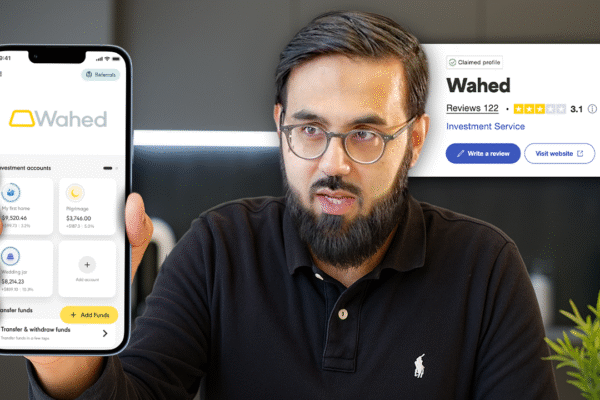
Is the S&P 500 Halal? A Guide for Muslim Investors
26 August 2025 7 min read


Haider Saleem
5 min read
Last updated on:
You want to make a profit on stocks and shares, but a high majority of people will lose money when investing directly themselves. There are three solutions to this:
This article is exploring (3) in more detail and makes the argument that the average investor has a competitive advantage only in small caps indices like the AIM (Alternative Investments Market) index.
We’ll share three reasons as to why we argue this:
After reading, you’ll have some food for thought on DIY AIM index investing.
Data is king when it comes to investing. Everyone – from professionals in large firms (institutional traders) to novices (retail traders) – want to keep their money and take yours.
In the main markets, professionals for a number of years have had access to algorithmic trading (AKA algo trading). This is where an algorithm will place a trade and create profits at a speed that a human cannot.
Computers will monitor stock prices, analyse the market and create instructions to buy and sell orders. Professionals work in teams, allowing them to refine and perfect the algorithms they design. Not good news for retail traders.
Furthermore, you’ll also be up against some of the smartest people in the world who are likely able to get data quicker, have access to the latest technology first and super-fast connections. They also make the market, so they see everything.
Can amateurs compete? There must be some sort of algo trading for armatures that eliminates some of these advantages professionals have?
Well, Quantopian – where amateur algo traders used crowdsourcing techniques to find market data and execute trades based on those patterns – announced in Oct 2020 that it was shutting down its community platform. They had 300,000 users and it was backed by hedge fund billionaire Steve Cohen and venture capital firm Andreessen Horowitz. Unfortunately, they couldn’t compete against the institutions and professionals.
Of course, algo trading isn’t perfect and even in the main market, some level of human judgement is required. For example, humans can sense a change in leadership, detect a change in sentiment in the board and access information that might not be available. Algorithms are only as good as the people that design them.
There are other open-source algo trading platforms out there. However, the increasing use of algo trading and the failure of Quantopain reminds us of the dominance that professionals have in the main market, especially when it comes to data.
Nevertheless, whilst amateurs rely on open source, professionals collaborate and keep it to themselves.
Luckily, not all hope is lost. The AIM market is known to be much more of a level playing field compared to the main market.
But where there are not that many pros playing, or that much data – is where the ordinary investor can have a competitive advantage. One such place is the AIM index. This is because companies on the AIM index are young and in their growth stage. They are usually looking for capital to grow and don’t have a long track record.
The techniques and advantages mentioned above will not matter as much on the AIM.
The reason is, there isn’t as much data on the companies and there isn’t as much liquidity in the market either. If you have a company with a total market capitalisation of £50m, it doesn’t make any sense for a large fund to buy it, where its minimum investment is £50m. That would mean the fund would buy out the entire company which it doesn’t want to do.
So large funds stay in the deeper capital markets of the FTSE – leaving AIM stocks relatively under-analysed.
And where something is under-analysed you have more chance of spotting a mispricing.
In your career, it really does pay off to be an expert in your field. It puts you ahead of your colleagues and competitors in your area. The same applies to investing.
At IFG we recommend reading The Zulu Principle by Jim Slater – a British accountant, investor and writer.
His investment style consists of combining growth and value. What does this exactly mean? These are shares that you identify as being valued low to their relative forecast earnings – i.e., stocks that you believe brokers are selling at a discount.
What’s the ‘Zulu Principle’? The book illustrates how focusing on one niche area can lead you to mastery and becoming an expert in that area. The cost of doing this is your time and effort. The result however is your ability to identify these discounted stocks with high growth potential. You’ll have a competitive advantage over investors who only have general knowledge.
As discussed, the AIM consists of stocks that we have little info on. Brokers are not experts in all fields and may undervalue some companies. Therefore, you as an expert can identify them and find a bargain.
Finally, how do you invest?
The AIM index involves putting money in companies that are yet to prove themselves over decades – relatively higher risk. The index has not only had companies with poor returns but some high-profile fraud cases. The FT reported in 2015, investors would have lost money in 72% of all the companies ever to have listed on Aim over the previous 20 years.
Wouldn’t it be nice to have a pre-selected list chosen by the best performing funds so you can choose from just the legit, profitable companies?
Luckily for you, we have exactly that here in the IFG Fund Replicator. We have taken the top 5 AIM funds, filtered out all the haram stocks, and what is left is the creme de la creme of the AIM index.
We also have a write up on tax benefits available which you can read more about here.
Technology is evolving and professional investors will always be ahead of the game. Furthermore, DIY investing is not easy.
However, we can help you.
If you enjoyed this article, you can follow me on Twitter or LinkedIn.

26 August 2025 7 min read

24 July 2025 15 min read

16 July 2025 5 min read
Leave a Reply